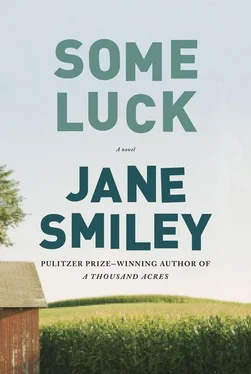The noise grew not louder, but more shrill, and came in little gusts. Frank kicked his feet.
Papa cocked his head and said, “Try it, then.”
Mama set down her fork and got up from the table. She went out of the room. Frank’s gaze followed her.
For every time Frank looked at Papa, he looked at Mama five times or ten times, even when Papa and Mama were both in the room. It seemed perfectly natural to him. Papa was tall and loud. His mouth was large and his teeth were big. His hair stuck up and his nose stuck out. When Papa’s hands went around him, he felt trapped rather than cuddled. When Papa lifted him and put his face down to meet his, there was a distinct sharpness that made his nose twitch. When Papa touched him, he could feel the roughness of his fingertips and palms against the bare baby skin. Papa shrank him. And when Papa was close, Frank had discovered, there was more likely to be noise. Frank had nothing to do with it. It just happened. Now, in the long moment when Mama was gone, Frank looked away from Papa toward the window.
“All right,” said Mama, “I found it in the sideboard. But you’ve got to put some sugar in the knot or he won’t be able to stand the bitter taste.” She reached for a cup on one of the shelves, and poured something into it. After that, she lifted the tray of Frank’s chair, all the while anchoring him with her hand, and then she took him in her arms and set him gently on her jiggling knee. The noise subsided considerably. But even so, she did put a thing in his mouth, first burning and then moist and sweet, and anyway something to suck upon. Papa said, “Ragnar, the English for that is ‘sugar tit.’ ”
“Oh, Walter,” exclaimed Mama. “For goodness’ sake.”
Ragnar said, “Sukker smokk.”
Mama said, “I am sure you are telling Ragnar all the best dirty English words while you are cleaning the hog pens.”
Frank felt his mouth working, pulling the sweetness through the bitterness. Normally while sucking, he would be looking at Mama, the curve of her jaw and the fall of her blond hair half covering her ear, but now he stared at the ceiling. It was flat, and as he sucked, it seemed to lower itself onto him. The last thing he heard was “Did he fall asleep?”
The jiggling continued.
NOW THAT HE was crawling, Frank found that many doors were closed to him. Most of the time, in fact, he was confined to a space in the dining room that was nowhere near the woodstove in the front room, or the range in the kitchen. Many things were denied him that he once enjoyed, including the quotidian miracle of the flung spoon — he could have a spoon only when he was secure in his high chair in the kitchen (and he now had a strap to tie him in, since he felt no scruples about arching his back and sliding downward beneath the tray in his attempt to find the floor and take off). Things that he picked up, no matter how small, were removed from his grasp before he could give them the most cursory inspection, not to mention get them to his mouth. It seemed that he could never get anything to his mouth that he actually wanted to get there. Whatever he grabbed was immediately removed and a cracker was substituted, but he had explored all the features of crackers, and there was nothing more about them that he cared to find out.
The only thing he had left was standing beside one of the cane-seated chairs in his confinement pen and banging on it with his hands, sometimes one, sometimes the other, sometimes alternately, sometimes together. The cane in the middle and the wood around it presented an interesting contrast. His fist smacked the wood and it hurt just a little, though not enough to matter. His fist smacked the cane and then bounced. He also laughed when he pushed the chair over, but that could backfire if he then fell down — his balance was improving, but he wasn’t walking yet. These were seductive feelings, but no substitute for everything else in the house — the staircase, the windows, the basket of firewood, the books that could be opened and closed and torn, the rocking chair that could be tipped over, the cat that could be chased (though not caught), the fringe of the rug that could be chewed. He couldn’t even go out onto the porch anymore — when that door flew open, a cold blast shot through it that made him gasp.
Mama and Papa came and went. When he made noise (he now knew where the noise came from and how to make it whenever he wanted to — you opened your mouth and pressed the noise out and there were a variety of noises that produced a variety of effects upon Mama and Papa), she appeared from beyond one of the doors — the kitchen door — and she had a cloth in her hands. She said, “Frankie hungry? Poor boy. Two more minutes, baby.” The door closed and she was gone. He pounded his fist on the cane-bottomed chair. The noise he made was “ma ma ma ma ma.” The kitchen door flew open. Rosanna said, “What did you say, Frankie?” She stepped into his enclosure and came down to him. She said, “Say it again, baby. Say ‘mama.’ ”
But he said something else, who knew what. It was just noise for now. When she stood up, he did another thing, which was to look up at her and raise both of his arms toward her. It had the desired effect: She said, “You are the most beautiful baby!” And she picked him up, sat down on the cane-seated chair, then opened her dry, hard front to reveal the desired warm, soft object beneath. Frank settled himself into her lap.
It was not the same as it had been, though. There had been a time when her lap was enough, the crook of her arm was enough, the breast itself and the lovely nipple were enough to envelop him in pleasure. Now he was half distracted even while enjoying himself. His gaze rolled around the room, taking in the top corners of the doors, the moldings, the pale light floating up from the windows, the design of the wallpaper, Mama’s face, and then around again, looking for something new. Mama absently stroked the top of his head. Her body relaxed and she slumped against the back of the chair. In the quiet of the room (quiet because Frank himself was making no noise), other sounds manifested themselves — the howl of the wind curling around the corners of the house, the clattering of ice against the house (muffled) and the windows (sharp). Sometimes the wind was so strong that the house itself creaked. Just then there was a loud cracking noise followed by a longer, higher sound. Mama sat up. She lifted Frank more toward her chin, said, “What was that?” and stood. They went to a window.
There was nothing more surprising than a window, and you could not get to them on your own. You might have looked out a window many times, and even though the window was right where it was the last time you looked through it, each time there was something different. Sometimes, there was nothing, only flat blackness, but this time there was only flat whiteness. And its smoothness was terrible — when Frank reached out and laid his hand on it, Mama cupped his hand in hers and brought it back to her chest. She said, “Oh, a big branch off the hickory tree. Right into the yard, too. It must be ten below out there, baby boy, or worse. That’s cold for this time of year. I hate to think what it’ll be like when winter actually gets here.” Her shoulders shook. She said, “And more sleet! I hope your papa and Ragnar got all the cows in, I hope they did!” She kissed him again, this time on the forehead. “Goodness me, what a life — and don’t tell him I said so!”
They sat down again, this time on the other side of the confinement barrier, in the big chair, and Mama put him to the other breast, the one he preferred, the one with more milk. And then, the next time he knew where he was, he was in his cot on his back with a blanket up to his chin, and then he didn’t know where he was again.
Читать дальше












